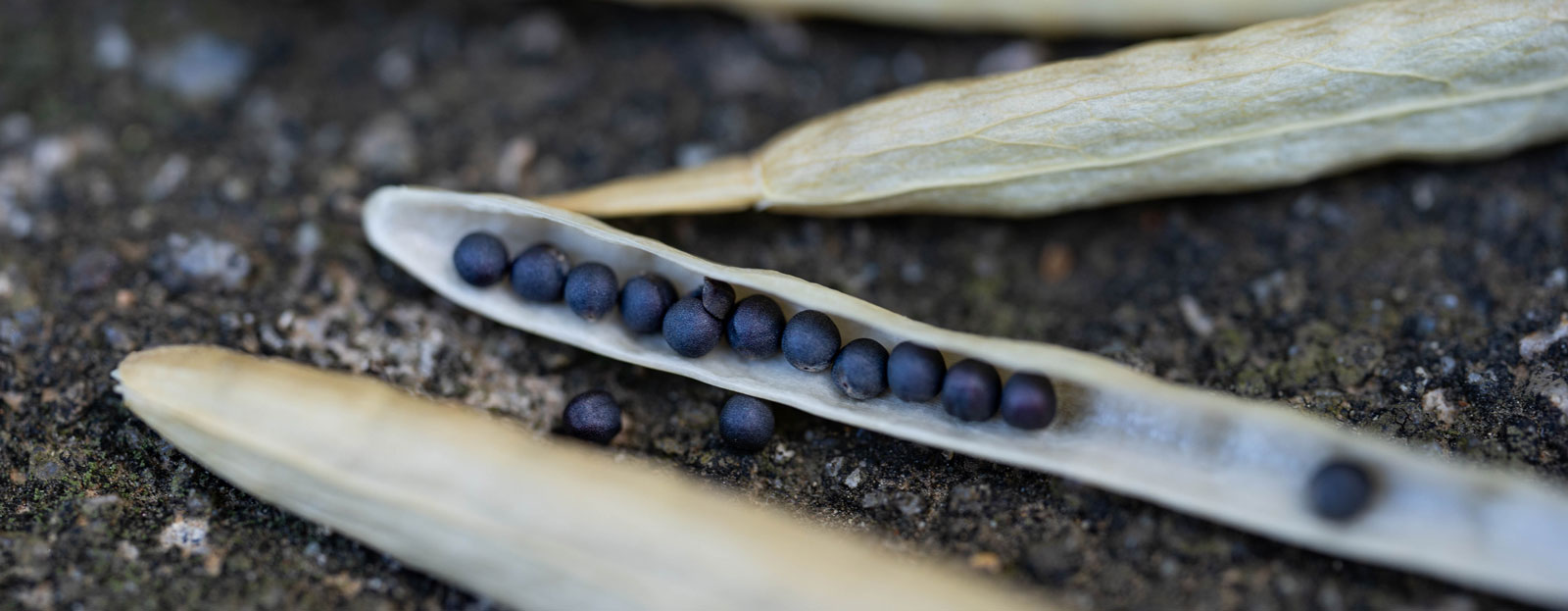With science changing along with the seasons, we look at the world of seed technology, offering a forecast.
By Marc Zienkiewicz, Senior Editor of Seed World Group
Right now exciting things are on the horizon for the seed sector in the new year, and some of them could positively affect retailers.
To help your customers become better prepared, here’s a forecast.
Watch for the Results of a Major Soil Health Study
Soil health is more important than ever, so much so that a senate committee is going across the country to study it.
According to Canadian Senator Robert Black from Ontario—who is spearheading the country’s first national senate soil health study in 40 years—urbanization, pollution, and climate change are among the key factors contributing to the degradation of soils.
“In the past, the importance of soil health and carbon sequestration was not as widely recognized as it is today. It’s imperative that the health of Canada’s soils is assessed and managed more comprehensively to ensure long-term sustainability,” Black stated.
The discourse on soil health has evolved considerably over the past 40 years, Black said, adding that the discourse is creating more awareness of soil health within the ag community.
“Back in the 1980s, the focus was primarily on traditional farming practices like summer fallowing. However, today, we’re witnessing the emergence of new technologies, products, and practices designed to enhance soil health,” related Black.
The committee has visited various research locations across Canada, including the University of Saskatchewan and the Canada Agriculture and Food Museum in Ottawa. It has issued some preliminary vital findings that could lead to new initiatives to help farmers sustain and improve soil health.
Findings from the committee include:
- Soil Plays a Crucial Role in Food Production: Soil is the fundamental component in our food production, offering vital nutrients, water, oxygen, and essential root support for plants. Improved soil quality translates to increased food yield from less land, which mainly benefits remote and urban areas grappling with limited farmland and helps address the global demand for food.
- Farming Practices Can Enhance Soil Health: Adopting no-till methods preserves valuable soil microorganisms crucial for plant growth. Planting cover crops is emerging as an increasingly popular strategy to minimize erosion. Additionally, soil mapping and water management technology advancements empower farmers to be better stewards of soil health.
- Soil Health and Climate Change are Interconnected: Climate change effects—including extreme weather events, altered rainfall patterns, and rising temperatures—impact soil health in multiple ways, including through erosion. Conversely, well-managed soil acts as a carbon sink, contributing significantly to the fight against climate change.
- We must Protect Soil as a Resource: Soil, a finite resource that requires centuries to form, faces imminent threats from urbanization, pollution, and climate change. The repercussions of these stressors extend to food accessibility, water quality, ecosystems, and the livelihoods of many Canadians.
Watch for the full study to be published at https://sencanada.ca/en/committees/AGFO/44-1.
The Industry Plan to Sell More Seed
As farms merge and expand, one farm can now farm the same land area that used to belong to 10 farms.
However, this change has not significantly affected the number of seeds sold in Canada.
Quality, certified seed is an important input for retailers and a crucial resource for growers. In 2024, the seed industry will continue an important discussion about certified seed that began at 2023’s AgSmart event in Olds, Alberta.
Held as part of the Field Crop Development Centre Field Day, the AgSmart event included a panel discussion facilitated by Seed World Canada magazine. It shed light on why increasing certified seed use is vital to the health of agriculture.
It saw four well-known members of the Alberta seed community offer their thoughts on how to secure the future of Canadian agriculture through certified seed.
The panel featured Sheri Strydhorst, a well-known agronomy researcher and owner of Sheri’s Ag Consulting; Jeff Jackson, the General Manager of SeedNet Canada; Chelsea Tomlinson, the seed grower and operator of True Seeds; and Greg Stamp, the Seed Sales Manager for Stamp Seeds.
The panel discussion revolved around the challenges faced by the Canadian farming industry, particularly those within the realm of seed breeding and adopting new crop genetics.
Jackson expressed his concerns about farm consolidation. Stamp followed by stating that it’s clear we are falling short in communicating the benefits of genetics effectively.
To illustrate this, Stamp started with the example of canola seed—a significant crop in Western Canada that has seen remarkable growth over the decades. “Despite the continuously rising cost of canola seed, farmers haven’t been deterred from planting more acres,” he said.
However, he added that a contrasting narrative emerges regarding certified seeds for cereal crops.
“Many perceive the cost as too high, but I believe we need to reshape this perspective,” commented Stamp. “We must work on conveying the message that this isn’t merely an expense; it’s an investment in securing the best possible future for our crops.
“It appears that growers often miss this crucial aspect, and I think there’s a significant effort required to bridge this gap in understanding,” noted Stamp.
Strydhorst acknowledged that it’s the seed industry’s responsibility to shoulder the task of education.
“Whenever I come across a fellow grower and inquire about the variety they’re cultivating, and they mention an old variety, I can’t help but feel like there’s so much untapped potential in alternative varieties,” she related.
“And I liken this situation to someone choosing to use a combine from the 1970s when they have the option to upgrade to newer models.”
The challenge here is that growers might not yet fully comprehend the remarkable benefits that genetics can bring to their crops, making education crucial, as Tomlinson suggested.
Taking responsibility and ready to do something about it, seed industry stakeholders will begin an informational campaign in 2024 to bring awareness to the need for greater certified seed adoption.
Seed Regulatory Modernization Next Phase
The Canadian Food Inspection Agency (CFIA) recently released its much-anticipated Seed Regulatory Modernization (SRM) “What We Heard.”
The report reveals the results of its SRM pre-consultation survey.
The report summarizes the stakeholder feedback on the SRM Task Team’s recommendations in several key areas.
The overall result of the SRM process is to create a seed system that meets the needs of modern and future generations.
The report is detailed but provides a summary of something very relevant to retailers: the question of whether or not Canada should continue to have a variety registration system. The CFIA’s Variety Registration Office (VRO) registers varieties of most crops in Canada.
According to the report, there was strong support for our variety registration system.
Survey respondents said:
- Variety registration creates a high level of trust, as the quality of traits is consistent in the seeds and crops grown in Canada. This equips farmers to decide what they grow while maintaining end-user confidence for products to be competitive in the market.
- There are marketing, branding, and reputational benefits to using registered seed varieties in Canada’s grain variety registration and classification system.
- The variety registration system should be made available to those crops and value chains that see value in this process, allowing them to decide on participation or placement within a national variety registration system.
During the winter of 2023–24, the CFIA plans to hold its second SRM consultation.
The first consultation covered three task teams: variety registration; seed standards and grade tables; and seed certification.
With the upcoming consultation, attention will shift to the remaining task team recommendations and working group suggestions.
The topics for discussion will include common seed, testing, and the import and export of seed.
According to Wendy Jahn, the National Manager for the CFIA Seed Section, once this consultation is complete and the CFIA has conducted its analysis, it will have a clearer sense of direction.
“In 2024, we intend to release a policy paper outlining our findings. We’re keen on obtaining input on this paper, and we’re exploring the possibility of a cross-country tour. The idea is to visit different provinces, bring stakeholders together, and engage in discussions. So, before reaching a final decision, there will be several opportunities for input and discussion,” she explained.
CFIA Offers Pre-Market Assessment Guidance
In 2024, the federal government will complete its new guidance on how quickly new seed products that utilize gene editing techniques can be brought to market.
The CFIA recently issued its draft guidance document titled “Determining the Need for Pre-Market Assessment for Plant-Derived Ingredients.” The document is designed to offer transparency concerning the circumstances in which plant-derived ingredients necessitate a pre-market assessment as outlined in the Feeds Regulations.
The CFIA said that it is also seeking to provide detailed insights into the defining attributes of plants that may lead to classifying an ingredient as novel in the context of livestock feed.
The move is the third step in revamping Canada’s regulatory landscape, as it concerns the CFIA’s Plants with Novel Traits (PNT) regulations.
The first two pieces of the puzzle were the CFIA’s reviews of its PNT guidelines regarding the environment and food. The CFIA has already released guidance on those areas, but policymakers and others in the industry have been waiting for public consultation regarding animal feed.
Ian Affleck, the Vice-President of Plant Biotechnology for CropLife Canada, said in May 2023 that guidance on pre-market assessment for plant ingredients in animal feed is needed to help researchers move forward in using modern plant breeding technologies like gene editing to create powerful new technologies faster.
Seed products developed using gene editing that are not considered novel would be equivalent to their existing counterparts and would not require pre-market assessments.
However, products with novel traits could affect the environment and human or animal health. Each would need to be evaluated by the CFIA and Health Canada before they could be sold.
“It’s important that we finish the third leg of the stool, so to speak, so that this technology has full access in Canada,” Affleck said.
New Seed Campaign Empowers Farmers
The Canadian Seed Growers’ Association (CSGA) has officially launched its #ChooseCertifiedSeed campaign.
The campaign highlights the importance of certified seed, why certified seed makes a difference, and makes its case to compel farmers, food processors, and consumers to choose certified seed for quality results.
The campaign is grounded by a website that serves as a treasure trove of information divided into sections that delve into the nuances of certified seed: its value; quality; identity assurance; traceability, and; trustworthiness.
Featuring heartfelt and compelling videos from Canadian seed growers and stakeholders that include their perspectives, genuine experiences, and passion, it forms the essence of the campaign, amplifying the message to farmers to choose certified seed.
As the global agricultural landscape becomes increasingly competitive and demanding, it’s crucial to highlight the many benefits of certified seed and the strength of the Canadian seed certification process.
“The #ChooseCertifiedSeed campaign empowers farmers to make informed decisions on the seed they choose to plant, demonstrates to food processors and manufacturers that using quality ingredients produced from certified seed is the foundation for quality food, and that when you #ChooseCertifiedSeed, it’s the highest quality, identity-assured, third-party verified seed to set you up for success,” noted the CSGA on its website.
To learn more about the campaign and how to participate, visit www.choosecertifiedseed.ca.
Related Articles
- AI & Ag A viewpoint on how artificial intelligence can positively impact the agricultural sector. By Andrew Joseph, Editor When it comes to AI, aka artificial intelligence, people either know all about it or they don’t. ...
- Canadian fertilizer and the new insect and lightning alternatives Could lightning-derived technology or cricket frass be a new fertilizer option for manufacturers? By Andrew Joseph, Editor It’s spring, a time when crop farmers and retailers think profoundly about fertilizer—the...
- Being level-headed about shipping over water Too much and too little water in our waterways is causing economic issues regarding how we get products in and out of Canada. This article examines the St. Lawrence Seaway, the Great Lakes, the Mississippi River, and...
- The world is not enough Wanting to do their part in reducing global GHG emissions, Canadian farmers still can’t catch a break from federal tax fees. But what’s going on around the world? By Andrew Joseph, Editor While there are always ...
- Views, Considerations & Unknowns for 2024 With 2024 upon us, the agriculture trade show and seminar season is now in full swing. By Mitch Rezansoff, Executive Director With 2024 upon us, the agriculture trade show and seminar season is now in full swing....
 How to resolve AdBlock issue?
How to resolve AdBlock issue? 




Join the discussion...
You must be logged in as a CAAR member to comment.
Report
My comments